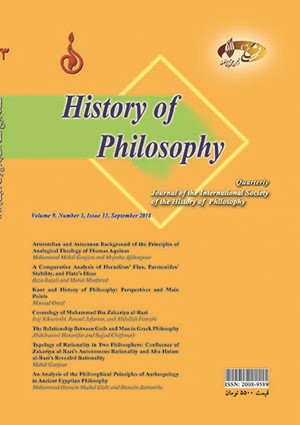The Relationship between Gods and Man in Greek Philosophy
Subject Areas : Philosophical thoughts in ancient Iran
Abdulrasul Hasanifar
1
*
![]() ,
Sajjad Chitforush
2
,
Sajjad Chitforush
2
1 -
2 -
Keywords: Greece Homer Socrates Plato God Man ,
Abstract :
Man’s behaviors and acts in each period are directly influenced by the ontological views and philosophical and religious principles of that period. Therefore, in order to understand the nature of such behaviors and acts, one might initially learn about the dominant ontological and epistemological principles of the time. One of such principles which is necessary for understanding human behavior and acts in each period pertains to the prevailing view of being and God, which directly affects one’s conduct in society. Given the necessity of cross-cultural knowledge in the contemporary era, the profound relationship between the Greeks and Iranians, and its effects on different aspects of their thoughts, the knowledge of the Greeks’ philosophical and behavioral principles could play a key role in the study of this cultural relationship. Accordingly, the present paper investigates the ontological views of the Greeks, their philosophical principles and, particularly, their views of God and the soul and the effect of such views on their behaviors and acts. In doing so, the authors have examined the ideas of three thinkers of the Greek era, namely, Homer, Socrates, and Plato, following an interpretive method. The results of this study indicate that the Greeks’ view of God in each period changed under the influence of the views of the thinkers of the time. In fact, Homer, Socrates, and Plato held distinct ideas in this regard. In Homer’s mythical view, Gods are like human heroes with human attributes and in transaction with human beings. However, in Socrates’s eye, God is a being who guides human beings and communicates with them through demons. Finally, in Plato’s philosophy, where polytheism moves toward monotheism, God, as the Idea of Good, is a transcendent Being who determines Man’s destiny and promulgates laws for their individual and social lives.
اروين، ترنس، تفکر در عهد باستان، ترجمه محمد سعيد حنايي کاشاني، تهران، نشر قصيده، 1380.
افلاطون، دوره آثار افلاطون، ترجمه محمدحسن لطفي، تهران، شرکت سهامي انتشارات خوارزمي، 1380.
اله¬بداشتي، علي، «افق خداشناسي در فلسفه ارسطويي و حکمت صدرايي»، خردنامه صدرا، ش36، بهار 1383.
روز، و.ه، خدايان، پهلوانان و انسان در يونان باستان، ترجمه عليرضا قربانيان، تهران، انتشارات اميرکبير، 1385.
زارعي، مجتبي، «فلسفه انسانشناسي حکمت متعاليه؛ در مقايسه تطبيقي با انسان يوناني و انسان مدرن»، فصلنامه سياست متعاليه، ش12، بهار 1395.
عباديان، محمود، فردوسي و سنت و نوآوري در حماسهسرايي، اليگودرز، چ1، 1369.
گاتري، دبليو. کي. سي، افلاطون: زندگي و آثار، محاورات اوليه سقراطي، ترجمه حسن فتحي، تهران، انتشارات فکر روز، بي تا.
گاتري، دبليو. کي. سي، تاريخ فلسفه يونان، ترجمه حسن فتحي، تهران، انتشارات فکر روز، ج12، چ1، 1376.
گاتري، دبليو. کي. سي، تاريخ فلسفه يونان، افلاطون: جمهور، ترجمه حسن فتحي، تهران، انتشارات فکر روز، ج15، 1377.
گادامر، هانس ـ گئورگ، آغاز فلسفه، ترجمه عزت¬الله فولادوند، تهران، نشر هرمس، 1387.
گريمال، پير، فرهنگ اساطير يونان و روم، ترجمه احمد بهمنش، تهران، انتشارات اميرکبير، 1378.
گمپرتس، تئودور، متفکران يوناني، ترجمه محمدحسن لطفي، تهران، انتشارات خوارزمي، 1375.
مصلح، علياصغر؛ موسوي مقدم، سيد رحمتالله، «نسبت انسان با خدا در فلسفه دکارت و نقد آن از ديدگاه محمدحسين طباطبايي»، پژوهشهاي فلسفي کلامي، ش48، تابستان 1390.
نشاطيه تاجيک، نرجس، اخلاق و سياست در انديشه سقراط تاريخي، تهران، نشر نگاه معاصر، 1390.
ورنر، يگر، پايديا، ترجمه محمد حسن لطفي، تهران، انتشارات خوارزمي، ج1، چ1، 1376.
هومر، اديسه، ترجمه سعيد نفيسي، تهران، شهر کتاب،1380.
ياسپرس، کارل، افلاطون، ترجمه محمدحسن لطفي، تهران، انتشارات خوارزمي، چ1، 1357.
يونسي، مصطفي؛ هاشمي، نرگس، «پوليس در هومر و سقراط»، فصلنامه رهيافتهاي بينالمللي، ش 25، بهار 1395.
Fine, Gail, Knowledge and Belief in Republic V-VII, Plato: Critical Assessments, vol. 2, edited by Nicholas D. Smith, London and New York: Routledge, 1998.
Mayhew, Robert, Plato Laws: 10, translated with commentary, New York: Oxford University Press, 2008.
Peters, F. E., Greek Philosophical Terms: A Historical Lexicon, New York: New York University Press, 1967.
Plato, The Collected Dialogues of Plato, edited by Edith Hamilton and Huntington Cairns, Princeton: Princeton University Press, 1961.
Plato, Timaeus, translated by B. Jowett in Dialogue of Plato, N. D, vol. 3, New York, Oxford, 2006.
Plato, Statesment, edited by Julia Annas and translated by Robin Waterfield, Cambridge University Press, 1995.
Robinson, R., Elenchus, Socrates: Critical Assessments, vol. 3, edited by William J. Prior, London and New York: Rotledge, 1996.
Ross, David, 1966, The Sun and the Idea of Good, Plato’s Republic: Interpretation and Criticism, edited by Alexander Sesonske, Belmont, California: Wadsworth Publishing Company.
Smith, Nicholas D. (ed.), Plato Critical Assessments, vol. 1, London and New York: Routledge, 1998.
Strauss, Leo, History of Political Philosophy, edited by Leo Strauss and Joseph Cropsey, third edition, Chicago and London: Chicago University Press, 1987.
Vlastos, Gregory, The Socratic Elenchus, Plato I: Metaphysics and Epistemology, edited by Gail Fine, Oxford: Oxford University Press, 1991.

